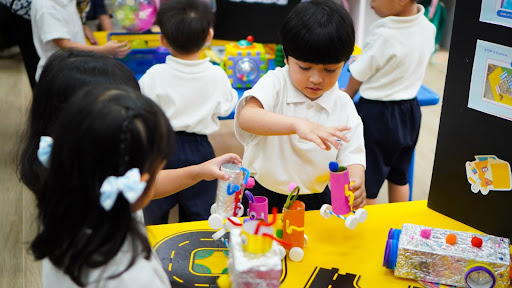Play-based learning is a popular approach to education in preschools, as it offers a wide range of benefits for young children.
This method of learning focuses on using play as a means of exploring and understanding the world around them, and encourages children to engage in hands-on activities that foster creativity, curiosity, and critical thinking.
Through play-based learning, children are able to develop important social, emotional, and cognitive skills, such as cooperation, problem-solving, and self-regulation, that will serve them well throughout their lives.
Additionally, play based learning helps to create a fun and engaging environment that promotes a love of learning and a positive attitude towards education.
At Sampoerna Academy, play-based learning is integrated into the curriculum and is used to create a fun and engaging learning environment.
The teachers are trained to observe and respond to children's interests, needs, and abilities in order to create a curriculum that is both challenging and engaging.
This approach to learning allows children to have fun while developing important skills that will serve them well in the future.

 Discover how your child aged 2 to 6 can gain advantages from early childhood education at Sampoerna Academy. We look forward to welcoming you and your child to the early childhood education program at Sampoerna Academy!
Take a look at how to apply.
Discover how your child aged 2 to 6 can gain advantages from early childhood education at Sampoerna Academy. We look forward to welcoming you and your child to the early childhood education program at Sampoerna Academy!
Take a look at how to apply.

What are the Benefits of Play-Based Learning?
There are many benefits to using play-based learning in education, including:-
Engagement in learning
-
Independent learning
-
Boosts creativity
-
Learning by doing
-
Expand language skills
-
Enjoying the unfamiliar
-
Independent problem-solving
 Discover how your child aged 2 to 6 can gain advantages from early childhood education at Sampoerna Academy. We look forward to welcoming you and your child to the early childhood education program at Sampoerna Academy!
Take a look at how to apply.
Discover how your child aged 2 to 6 can gain advantages from early childhood education at Sampoerna Academy. We look forward to welcoming you and your child to the early childhood education program at Sampoerna Academy!
Take a look at how to apply.


